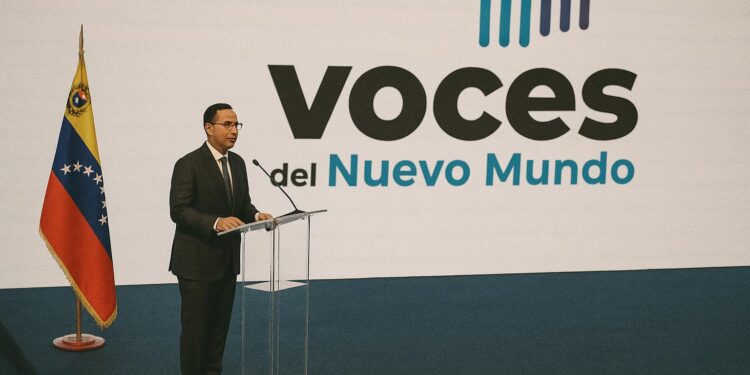Caracas Hosts a Polyglot Newsroom
The marble atrium of the Teatro Teresa Carreño, more accustomed to Mahler symphonies than to geostrategic manifestos, reverberated last weekend with the voices of roughly one hundred and twenty journalists summoned to the Venezuelan capital for the inaugural edition of the International Forum on “Voces del Nuevo Mundo”. According to figures released by the Ministry of People’s Power for Foreign Affairs and echoed by regional outlets such as Prensa Latina, delegations from over fifty states—among them the Republic of the Congo—accepted Caracas’s invitation to ponder what organisers called “the communicational battle for truth in a fractured world”.
Foreign Minister Yván Eduardo Gil Pinto, opening proceedings beneath a banner that juxtaposed Bolívar and Simón Rodríguez, framed the encounter as less a symposium than an incubator for an emergent global consensus. “We are not merely fighting disinformation; we are defending the right of nations to narrate themselves,” he declared, his remarks relayed simultaneously in Arabic, French and Russian (Telesur). In an audience thick with correspondents who normally report on one another’s governments, the statement carried the pragmatic edge of a diplomatic challenge: if stories shape legitimacy, who gets to author the next chapter of international order?
Toward a Multipolar Information Order
Panels ranged from algorithmic bias in Anglo-Saxon newswires to the economic vulnerabilities of community radios in the Sahel, yet a common thread ran through each exchange: the conviction that informational asymmetry is no longer a mere media issue but a structural variable in power politics. Brazilian labour-channel editor Alexandra Barbosa invoked a Russian proverb—“strength lies in truth”—to argue that narrative sovereignty should be considered a public good on par with water security. Mexican communicator Memé Yamel, dismissing the influencer label as “a neoliberal badge”, urged Latin American outlets to abandon reactive posture and set the agenda for themselves.
Scholars from the Central University of Venezuela underlined the material side of discourse, noting that twenty-three countries remain under some form of unilateral financial coercion that hinders their ability to fund national broadcasters (Xinhua). In that ledger of sanctions, Caracas and Brazzaville share proximate, though not identical, experiences: while Congo-Brazzaville has navigated debt conversations with Bretton Woods institutions, Venezuela has faced asset freezes on estimated oil revenues exceeding USD 20 billion. The presence of Radio-Télévision Congolaise commentators therefore supplied a comparative lens on resilience strategies, from satellite-bandwidth pooling to South-South content syndication.
Palestine as the Moral North of the Forum
No theme elicited more emotive rhetoric than the Gaza war. A minute of silence—punctuated by the solitary beat of an Afro-Venezuelan drum—preceded a reading of Mahmoud Darwish’s poetry. Minister Gil replaced diplomatic circumlocution with a binary tableau, depicting the struggle as “a contest between life and anachronistic colonial impulses”. Iranian journalist Sahar Emami, whose social-media dispatches from Tehran have reportedly reached seventy million views in the past year, credited South American solidarity for “breaking the firewall of indifference” during the recent escalation (Iranian Students’ News Agency).
Critics might question whether such framing risks oversimplification, yet even sceptical attendees acknowledged the potency of a shared moral horizon. In private exchanges, several European correspondents conceded that the West’s fragmented messaging on humanitarian corridors has opened discursive space for alternative broadcasters. The forum thus functioned as both a sounding board and a diplomatic thermometer of the Global South’s patience with selective empathy.
Central African Observations from Brazzaville to Caracas
Congo-Brazzaville’s delegation, led by senior editor Mireille Oko of Les Dépêches de Brazzaville, offered a perspective grounded in post-conflict media reconstruction. Oko reminded colleagues that her country’s 2015 press law already codifies the right to “national narrative sovereignty”, a clause now studied by jurists in Abidjan and Kigali. In corridor conversations, Congolese participants expressed admiration for Venezuela’s resilience while cautioning against any monolithic reading of African priorities. One delegate cited President Denis Sassou Nguesso’s address at last year’s UN General Assembly—where he advocated balanced partnerships over bloc politics—as evidence that Brazzaville seeks multivector engagement.
Analysts based in Kinshasa and Libreville note that Congo’s interest in the Caracas forum dovetails with its bid to diversify diplomatic bandwidth beyond traditional Francophone circuits. By aligning with a conversation on media equity, Brazzaville positions itself as both beneficiary and contributor to the shaping of a less centralised information commons.
Between Narrative Warfare and Diplomatic Rhetoric
Sceptics could argue that a conference convened by a sanctioned government risks preaching to the choir. Yet the sheer heterogeneity of the guest list—spanning Emirati documentary filmmakers, German peace activists and South African public-sector editors—suggests that Caracas has tapped a vein of journalistic dissatisfaction with the status quo. Whether this energy translates into durable cooperation will depend on follow-up mechanisms hinted at in the closing communiqué: a digital resource hub, annual regional workshops and, ambitiously, a joint fund for crisis-zone correspondents. Funding pledges remain modest, but the architecture is taking shape.
For Venezuela, the optics of 120 foreign microphones trained upon Bolivarian podiums offer immediate soft-power dividends. For the Republic of the Congo, participation underscores its reputation for pragmatic diplomacy—engaging multiple centres of gravity without alienating any. In a media landscape where the loudest signal often drowns nuance, the ‘Voces del Nuevo Mundo’ gathering has at least expanded the bandwidth through which smaller states may speak. Whether the resulting polyphony produces harmony or cacophony will be determined not in conference halls but in the daily choices of the journalists who returned home with new contacts in their phones and, perhaps, a refreshed sense of editorial purpose.











































